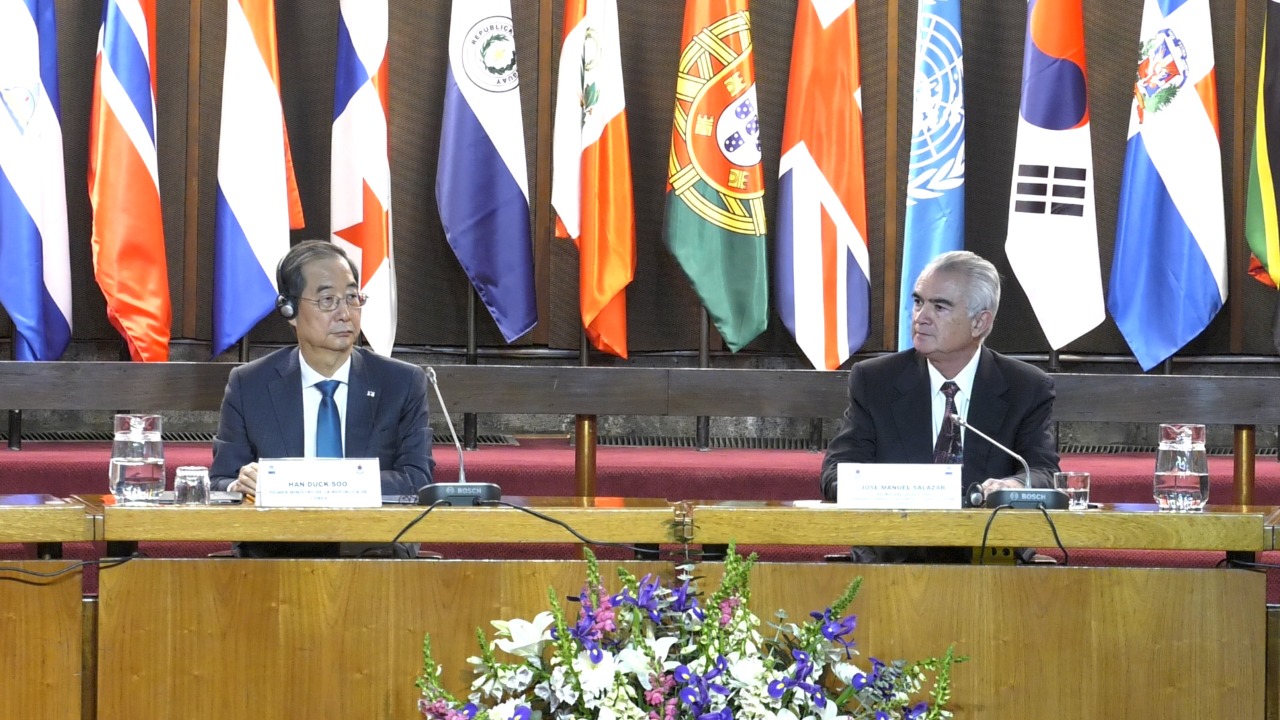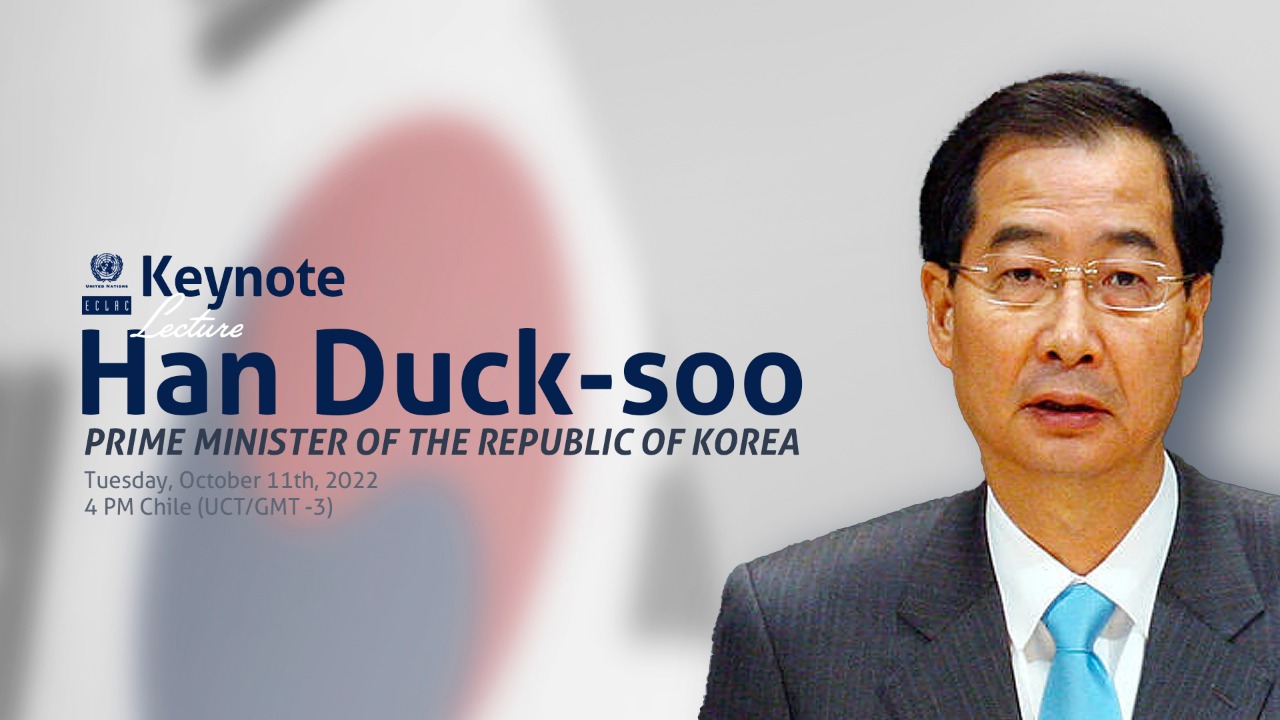Prime Minister of Korea Urges for Forging a New Cooperation with Latin America, as a Forward-Looking Vision amid the Major Transformations Humanity is Living Through
Han Duck-soo gave a keynote lecture at ECLAC’s headquarters, during a high-level event that was inaugurated by the United Nations regional commission’s Executive Secretary, José Manuel Salazar-Xirinachs.

The Prime Minister of the Republic of Korea, Han Duck-soo, delivered a keynote lecture this Tuesday, October 11 at the headquarters of the Economic Commission for Latin America and the Caribbean (ECLAC) in Santiago, Chile, in which he urged for forging a new cooperation with Latin America, articulating his country’s experience of innovation with the region’s potential, as a forward-looking vision amid the major transformations that humanity is living through.
The Korean leader spoke at a high-level event that was inaugurated by José Manuel Salazar-Xirinachs, Executive Secretary of ECLAC, and which featured the presence of diplomatic authorities from South Korea and from the region of Latin America and the Caribbean, along with representatives of academia and the United Nations System, among other guests.
In his keynote lecture entitled “Vision for the future of cooperation between the Republic of Korea and Latin America and the Caribbean in an era of great transformation,” Prime Minister Han Duck-soo recalled that 2022 coincides with the sixtieth anniversary of the establishment of diplomatic relations between South Korea and 15 Latin American countries, “a period marked by a joint path towards freedom, peace and international cooperation.”
“Today we are witnesses to the major transformations that humanity is living through. The climate crisis and the pandemic require that we make fundamental changes to current forms of cooperation. The innovation of advanced technologies, such as digital ones, is shaking the foundations that sustain the industrial fabric of each nation. The social gap, which widens in this process, has become a problem that cannot go unnoticed. Above all, the instability of the global supply chain entails the greatest challenge that we must resolve and demands an unprecedented response from the international community. In the current context, I would like to propose – as a forward-looking vision for the Republic of Korea and Latin America – forging a new cooperation, articulating my country’s experience of innovation with this region’s potential,” he stated.
South Korea’s highest authority emphasized that his country and Latin America are effective partners that contribute to the stability of the global supply chain, and he expressed confidence that they would be able to strengthen bilateral cooperation based on mutual trust.
He specified that South Korea is in a position to provide cooperation with value that would respond to the needs of Latin American countries, not only in terms of the response to climate change – which involves the hydrogen economy, agricultural innovation and forest protection – but also in the area of digital innovation.
“This process will be accompanied by fostering Official Development Assistance in digital, health and green sectors, contributing to development and inclusive growth in Latin America,” he underscored.
Han Duck-soo highlighted the efforts that the Government of Korea is making to host the World Expo 2030, a gathering that, under the theme of “Transforming Our World, Navigating Toward a Better Future,” will take place in the city of Busan and will allow Korea and Latin America “to share their experiences of growth, takeoff, as well as their technologies, while they jointly outline their vision for the future.”
“South Korea and Latin American countries have been accumulating understanding, trust and memory over the last 60 years. Now is the time to take advantage of the friendship and trust that unite us to accompany each other for 60 years more,” he urged.
Meanwhile, the Executive Secretary of ECLAC, José Manuel Salazar-Xirinachs, emphasized that at a time of growing geopolitical tension and weakening multilateralism on various fronts, Korea’s commitment to international cooperation, dialogue and support for the sustainable transition of developing countries – including as host country to the Green Climate Fund – is exemplary.
He said that Korea’s extraordinary economic development in the last seven decades is truly an inspiration for all countries in Latin America and the Caribbean, for ECLAC, and for all students of economic development worldwide.
“Since the 1950s, Korea has reinvented itself through a transformation led by the State, bold innovation strategies and industrial policies, big investments in research and development, policies for skills development and education with a forward-looking vision, public-private collaboration in strategic sectors and a coherent focus on gaining competitiveness in international markets. Today, Korea is an economic and technological powerhouse and a pioneer in global innovation and the transition towards a green economy. Korea’s experience is an invaluable point of reference for helping us understand how to close the development gaps in our region,” the senior United Nations official declared.
He noted that with the cumulative effects of the COVID-19 pandemic and the impacts of the war in Ukraine on the global and regional economy, these gaps are widening today: according to ECLAC’s estimates, Latin America and the Caribbean’s economies will return to the path of low growth seen between 2014 and 2019.
“The 6.2% recovery of regional GDP in 2021 was transitory and it has not been enough to mitigate the social impacts of the pandemic, which has also deepened the region’s structural challenges, such as high levels of informality, low productivity and low investment levels. ECLAC estimates that the region’s economic growth will be just 2.7% in 2022,” he warned.
ECLAC’s Executive Secretary specified that the economic deceleration is also affecting the recovery of labor markets, including women’s labor force participation, which at 51.1% continues to lag far behind men’s participation at 74.9%, marking a difference of nearly 25 percentage points.
Furthermore, many governments are facing a challenging fiscal situation and growing levels of debt that limit their ability to address these challenges.
In this context, ECLAC’s highest authority affirmed that “international cooperation with Latin America and the Caribbean – a region of predominantly middle-income countries – becomes even more urgent. Korea is a valuable development, trade and investment partner to the region, and in the last two decades our cooperation has expanded rapidly.”
In his speech, José Manuel Salazar-Xirinachs expressed appreciation for the cooperation program that the Commission has with the Republic of Korea, in areas such as trade facilitation, global supply chains, economic security, infrastructure and digitalization, in addition to emerging issues such as e-government, nature-based solutions in agricultural production, technologies for climate change adaptation in cities, and the impacts of the demographic transition on development.
“At a time of great turbulence in global affairs, both Korea and Latin America and the Caribbean defend the values of sustainable development, peace and multilateral cooperation. At ECLAC we hope to continue our valuable partnership for development cooperation and help our region and the Republic of Korea draw ever closer,” he concluded.
Prior to the keynote lecture, the Prime Minister of the Republic of Korea, Han Duck-soo, and the Executive Secretary of ECLAC, José Manuel Salazar-Xirinachs, held a bilateral meeting in which they addressed the deepening of the historical ties between both parties.
Related event
First session of the Regional Conference on South South Cooperation in Latin America and the Caribbean
The Regional Conference was established by virtue of resolution 752(PLEN.36) adopted by the member States of ECLAC at the thirty-sixth session of its Committee of the Whole in December 2021. In that…
Related content

Prime Minister of the Republic of Korea Will Give a Keynote Lecture at ECLAC
Han Duck-soo will speak at the United Nations organization’s central headquarters in Santiago on Tuesday, October 11, in the context of an official visit to Chile.
Related link(s)
Country(ies)
- Latin America and the Caribbean
-
Korea, Republic of
Contact
Public Information Unit
- prensa@cepal.org
- (56 2) 2210 2040